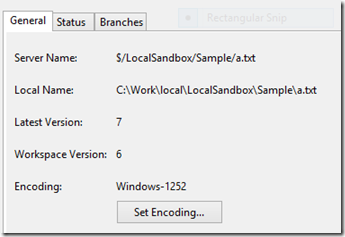Finding What’s Out of Date In your Workspace
A couple of customers have asked me about this in the past couple of weeks: “How can I tell in my workspace, how far out of date are my files?”
TFS knows if your file is out-of-date and will tell you simply by showing you a “No” in the Latest column in Source Control Explorer:

But what if you want to know how far out of date your file is? You can see this by accessing the properties of the file (right-click, select Advanced->Properties):

As you can see in the above screenshot, I’m one version behind.
Easy, right?
But what if I want to know this for all the files in my workspace? Using the built-in mechanisms, I’d have to look at the properties of each file that shows “No” in the Latest column. That could take a while!
As a side note, if I don’t care how far out of date I am, but I at least want to know all the files that are out-of-date, I could use the /preview switch on the command line tf get:

Notice that a.txt and d.txt in the command line correspond with what’s shown as out-of-date in the first screenshot. (BTW, nothing actually happened because I specified /preview. And the “Replacing” tells me that these files need to be replaced, or “caught up”.
However, let’s assume I want to know the workspace and server versions for all my files that are outdated in my workspace. There’s not a very convenient manner to do this without several clicks, but it’s surprisingly easy through the TFS API.
Here’s a quick, full sample console application that:
- Connects to my TFS server (only works for “on prem” TFS, not TF Service (it will work, but not by using WindowsIdentity))
- Grabs your workspace
- For each file in your workspace, checks to see if the workspace version is different than the server version.
- Spits everything out to the console.
The code isn’t anything special (I’m not a developer by trade), but it works.
using Microsoft.TeamFoundation.Client;
using Microsoft.TeamFoundation.VersionControl.Client;
using System;
using System.Collections.Generic;
using System.Linq;
using System.Security.Principal;
using System.Text;
using System.Threading.Tasks;
namespace WorkspaceVersions
{
class Program
{
private const string _TfsUrl = "https://<myTFS>/defaultcollection";
private const string _TfsProject = "$/<myproject>";
private const bool _OnlyListOutOfDate = true;
static void Main(string[] args)
{
Print("Connecting to TFS..");
// Connect to the team project collection and the server that hosts the
// version-control repository.
TfsTeamProjectCollection tpc = new TfsTeamProjectCollection(
new Uri(_TfsUrl));
VersionControlServer vcServer = tpc.GetService<VersionControlServer>();
// Get workspace versions
ListWorkspaceVersions(vcServer, _TfsProject);
Print("");
Print("Finished.");
Console.ReadLine();
}
/// <summary>
/// Silly convenience method for printing a line of text to the console.
/// </summary>
/// <param name="text"></param>
private static void Print(string text)
{
Console.WriteLine(text);
}
private static void ListWorkspaceVersions(VersionControlServer vcs, string project)
{
Print("Getting workspace..");
var workspace = vcs.QueryWorkspaces(null, WindowsIdentity.GetCurrent().Name,
System.Environment.MachineName).First();
Print("Getting working folder for the project..");
var folder = workspace.Folders.First(f => f.ServerItem == project);
Print("Getting local versions..");
List<LocalVersion[]> items = workspace.GetLocalVersions(new[] {
new ItemSpec(folder.LocalItem, RecursionType.Full) },
false).ToList<LocalVersion[]>();
if (_OnlyListOutOfDate)
Print("NOTE: Only listing items which are out-of-date");
foreach (LocalVersion[] locals in items)
{
foreach (LocalVersion item in locals)
{
int serverversion = vcs.QueryHistory(
new ItemSpec(workspace.GetServerItemForLocalItem(item.Item),RecursionType.Full),
1).First<Changeset>().ChangesetId;
if ((_OnlyListOutOfDate && (serverversion != item.Version)) || _OnlyListOutOfDate == false)
{
Print(item.Item);
Print(String.Format(" Server: {0}, Local: {1}", serverversion, item.Version));
}
}
}
}
}
}
If you are comfortable in the command line, this may work out well for you.